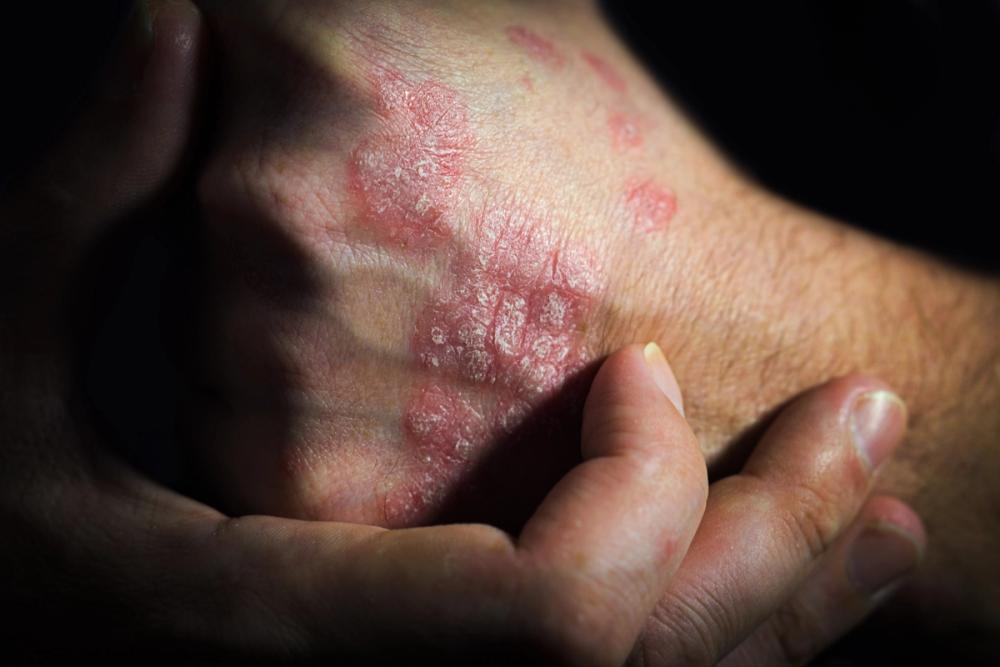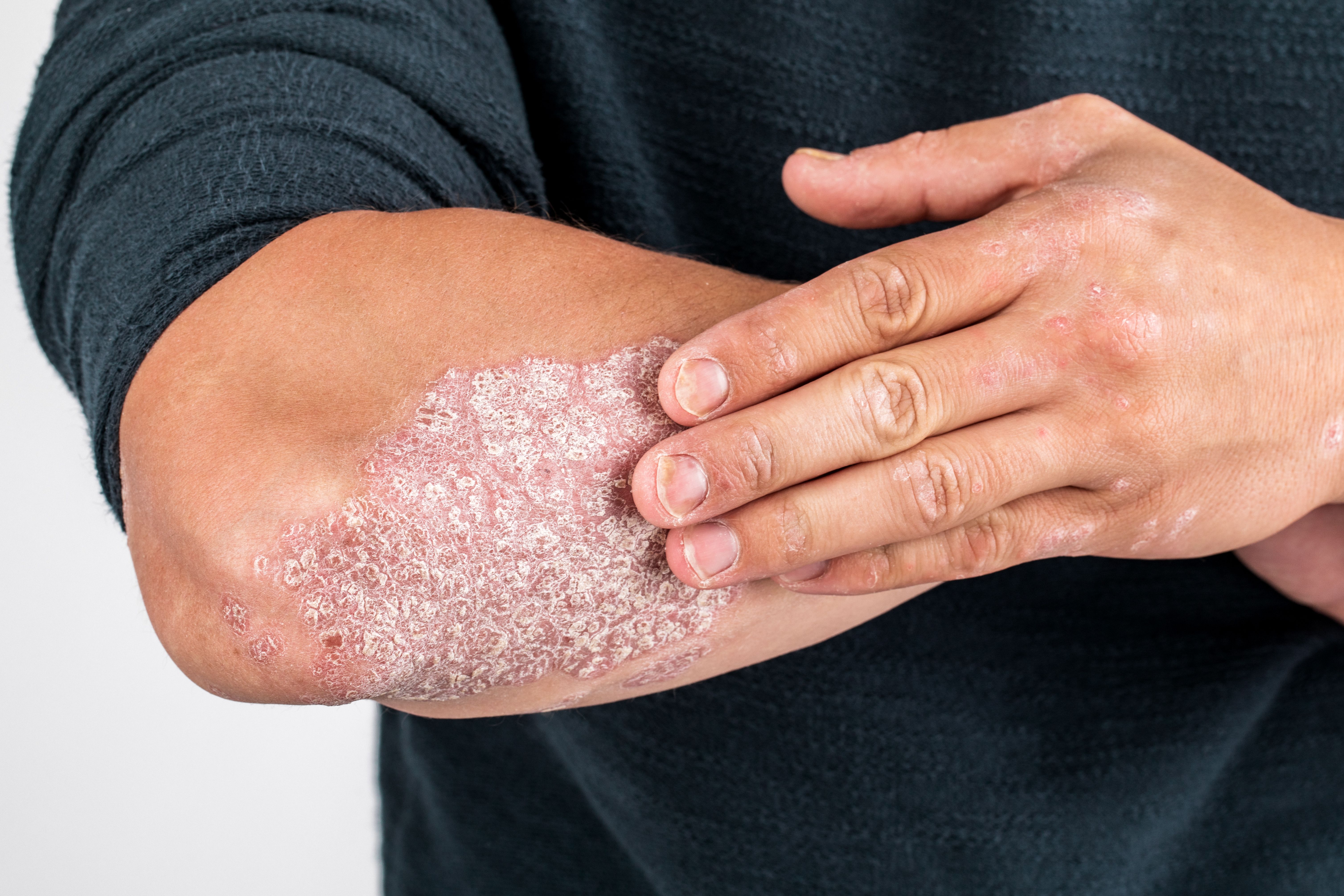Article
Once-Daily Oral Pill for Plaque Psoriasis Shows Promise
Author(s):
Deuvacracitinib (Sotyktu), which the FDA approved in September 2022, is a first-of-its-class tyrosine kinase 2 inhibitor and a member of the Janus kinase family.
In September 2022, the FDA approved a new plaque psoriasis medication, deuvacracitinib (Sotyktu), and it may serve as a promising therapy for individuals with moderate-to-severe plaque psoriasis.
SergeVo - stock.adobe.com

Plaque psoriasis is a chronic inflammatory skin disease characterized by overgrowth of skin layers that often occurs simultaneously with other chronic conditions, such as arthritis, metabolic syndrome, and obesity.1,2
Psoriasis is best treated with a personalized approach to medicine by targeting the specific markers in an individual’s genes that puts them at risk for disease activity, according to an expert panel.1
Some of the markers that have been identified include Th1 (IL-2, IL-12, and IFN-g), macrophagic M1 (IL-1, IL-6, and TNF-a), and Th17 (IL-6 and IL-17) cytokines.1
When it comes to targeted treatment, most of the recent drugs have targeted IL-12/IL-23, IL-17, and TNF-a cytokines.1
Here are some of the biologics used for the treatment of moderate-to-severe plaque psoriasis:
- Ixekizumab (Taltz) and Secukinumab (Cosentyx), which target the IL-17A cytokine1
- Adalimubab (Humira), etanercept (Enbrel), and infliximab (Remicade), which target the TNF-a cytokines
- Stelara (Ustekinumab), which targets the IL-12 and IL-23 cytokines
Sotyktu is first-of-its-class tyrosine kinase 2 inhibitor, and a member of the Janus kinase (JAK) family.3,4 It is used for moderate-to-severe plaque psoriasis in individuals who are candidates for phototherapy or systemic therapy.3
In a large, phase 3, randomized clinical trial conducted between 2018 and 2019, Sotyktu was tested against a placebo and apremilast (Otezla) to measure a reduction in the psoriasis area and severity index (PASI). This study was conducted in 16 countries, in adults with moderate-to-severe plaque psoriasis. Participants who had received prior therapy, excluding Otezla or Sotyktu, or had previously been treated with a biologic had an adequate washout period before they were randomized for this study.5
At week 16, participants receiving Sotyktu were found to have 75% or higher clearer skin from the baseline compared with patients who were treated with Otezla or a placebo, at 39.8% and 9.4%, respectively. Patients continued to sustain a PASI 75 score (clear skin) at week 24 and at week 52, after 1 year of continuous treatment.5
Sotyku is dosed once daily, which may be convenient option for those with compliance issues. Otezla, by contrast, is titrated up, and dosed 30 mg twice daily.5 In clinical trials, the rates of discontinuation in the Sotyktu group were lower than the placebo or Otezla groups.5
Counseling Points
Sotyktu is taken orally once daily, with or without food. It should not be crushed or cut and must be swallowed whole.3
Heterosexually active women who could become pregnant should be on an effective birth control method while taking this medication, to avoid the chance of pregnancy.3 Because this drug was not tested in lactating or pregnant women, it should not be given to this patient population. Sotyktu should also not be given to children.3,5
The most common adverse effects of this medication are acne, folliculitis, mouth ulcers, nasopharyngitis, and respiratory infections.3,5 Pharmacists should not give live vaccines, such as herpes zoster, to patients taking Sotyktu. Because this medication suppresses the immune system, it is possible for patient to contract serious infections. All patients should be screened for tuberculosis, both active and latent, before starting therapy.3
Financial Barriers
Sotyktu comes with a large price tag, around $6501 for a supply of 30 tablets, according to Drugs.com.
This will most likely be cost prohibitive for the general patient population.6 There may be discount programs available through the manufacturer.6 Until the cost goes down, and this drug becomes readily available in all pharmacies, the best treatment options for patients continues to be those that are accessible, covered by insurance, and safe.
Clinical Trial Limitations
As a caveat, it must be noted that this large study had several conflicts of interest, including investigators who were receiving grant and financial support from the pharmaceutical companies to conduct this research, as well as serving as consultants for these companies, which may ultimately have favored the results in favor of this new drug, despite the double blinding.
References
1. Camela E, Potestio L, Fabbrocini G, Ruggiero A, Megna M. New frontiers in personalized medicine in psoriasis. Expert Opin Biol Ther. 2022;22(12):1431-1433. doi:10.1080/14712598.2022.2113872
2. Kanda N. Psoriasis: pathogenesis, comorbidities, and therapy updated. Int J Mol Sci. 2021;22(6):2979. doi:10.3390/ijms22062979
3. Sotytku. Prescribing information. Bristol-Myers Squibb Company. 2022. Accessed May 8, 2023. https://www.accessdata.fda.gov/drugsatfda_docs/label/2022/214958s000lbl.pdf
4. Sotyktu. Bristol Myers Squibb. Accessed May 8, 2023. https://www.sotyktu.com/about-sotyktu/how-sotyktu-works
5. Strober B, Thaçi D, Sofen H, et al. Deucravacitinib versus placebo and apremilast in moderate to severe plaque psoriasis: efficacy and safety results from the 52-week, randomized, double-blinded, phase 3 program for evaluation of TYK2 inhibitor psoriasis second trial. J Am Acad Dermatol. 2023;88(1):40-51. doi:10.1016/j.jaad.2022.08.061
6. Sotyktu prices, coupons, and patient assistance programs. Drugs.com. Accessed April 10, 2023. https://www.drugs.com/price-guide/sotyktu
Newsletter
Stay informed on drug updates, treatment guidelines, and pharmacy practice trends—subscribe to Pharmacy Times for weekly clinical insights.

FDA Approves Roflumilast Topical Foam 0.3% for Plaque Psoriasis in Adults and Children





